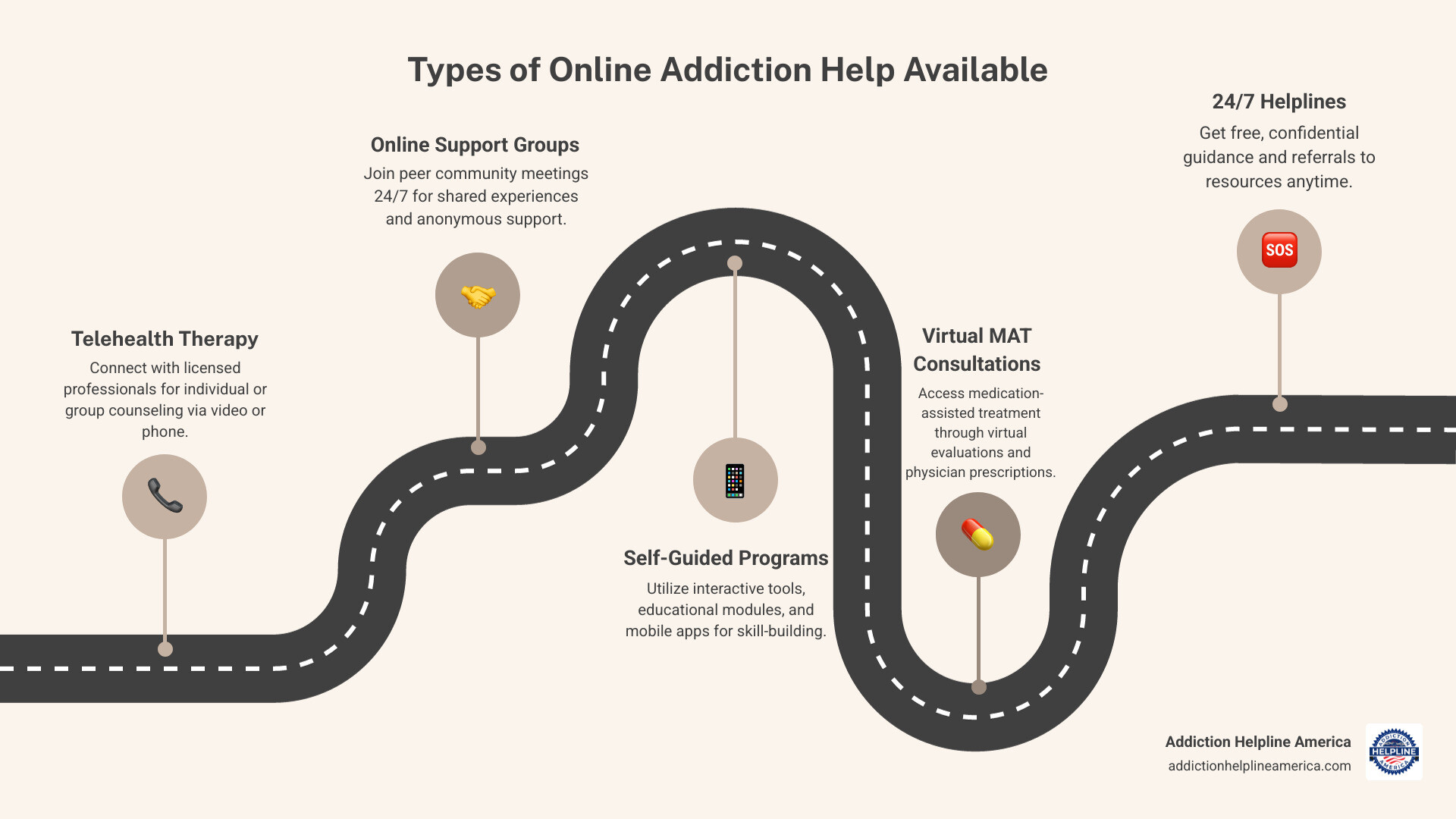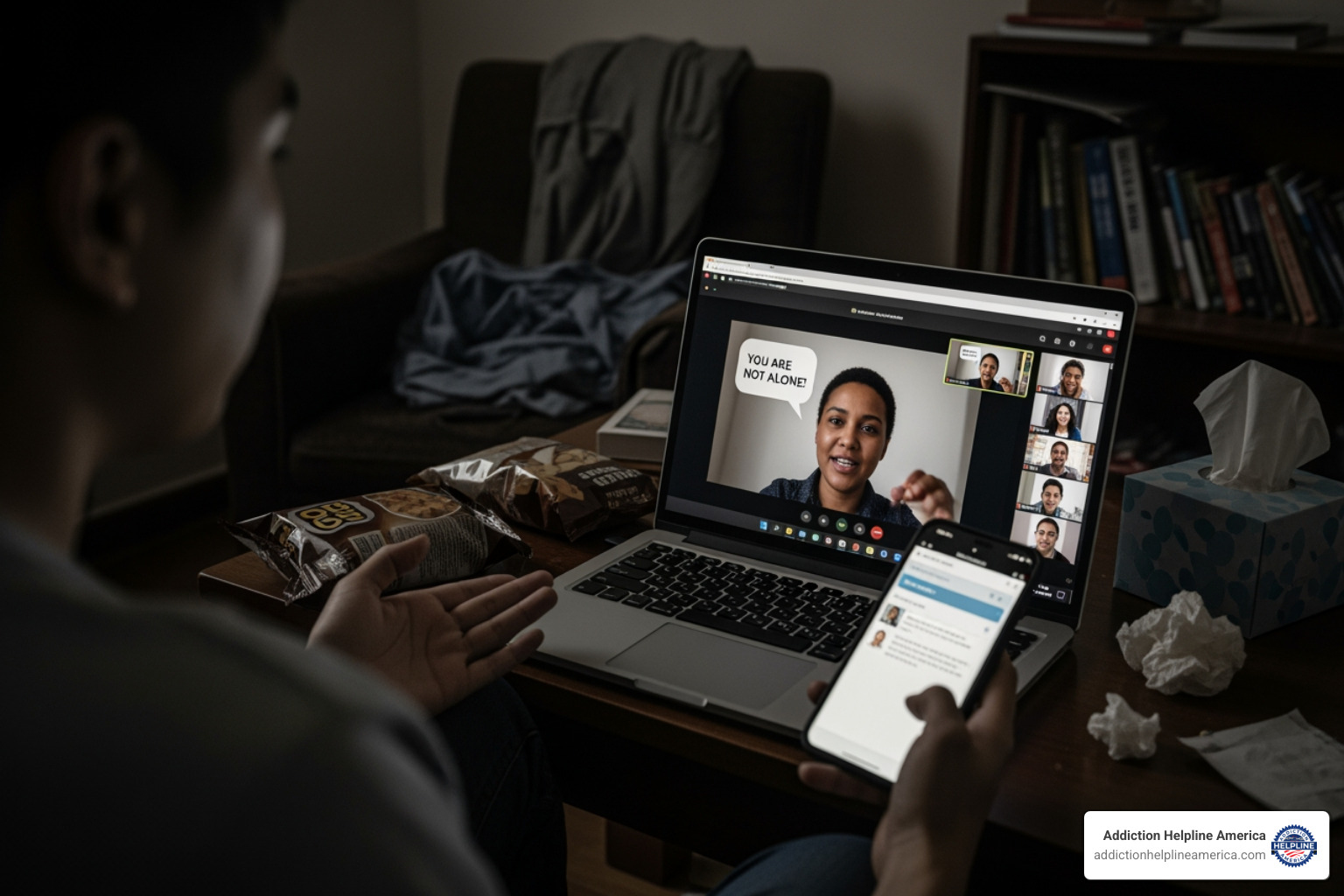
Why Getting Addiction Help Online Matters More Than Ever
Addiction help online is more accessible than ever, offering a lifeline to millions who need support. If you’re looking for help that fits your life, virtual care provides a convenient and effective path to recovery from home.
How to Get Started with Online Addiction Help:
- Access telehealth treatment for virtual therapy and counseling.
- Join online support groups for free, 24/7 peer meetings.
- Use self-guided tools like mobile apps for recovery support.
- Verify your insurance, as many plans now cover virtual treatment.
Since the pandemic, telehealth services have expanded, with research showing that online cognitive-behavioral therapy (CBT) is no less effective than face-to-face counseling. These convenient options often lead to better participation rates.
At Addiction Helpline America, we help individuals and families find effective addiction treatment, including quality online services. Our team provides confidential guidance to help you find the right addiction help online for your needs. This guide will walk you through the process, making it clear and manageable.
Learn more about Addiction help online:
Step 1: Understand the Different Types of Online Support
When looking for addiction help online, you’ll find a range of services that use technology to bring support to you. These options, often called telehealth or virtual care, allow you to connect with help using your phone or computer, fitting recovery into your life. To learn more about what treatment entails, see our guides on drug addiction treatment and the definition of addiction.
Telehealth and Online Therapy
Telehealth lets you work with licensed therapists through secure video or phone calls. Virtual outpatient programs offer a full treatment experience from home, combining individual and group therapy. These programs use proven methods like Cognitive-Behavioral Therapy (CBT), which research shows is as effective online as in person. This format allows you to fit therapy into your schedule without the need for travel.
Online Mutual Support Groups
Connecting with peers who understand your struggle is a powerful part of recovery. Online support groups like Alcoholics Anonymous, Narcotics Anonymous, and SMART Recovery offer community forums and virtual meetings 24/7. The anonymity can make it easier to share, and platforms like In The Rooms host meetings around the clock. These shared experiences provide comfort and prove you’re not alone. We can help you find online support groups that fit your needs.
Self-Guided Programs and Tools
For recovery at your own pace, self-guided programs offer mobile resources and web-based tools. Apps and websites provide educational modules and skill-building exercises to help you track urges, identify triggers, and learn coping strategies. Programs like CheckUp & Choices and CBT4CBT offer interactive ways to build recovery skills. These tools are excellent supplements to professional treatment or as a first step. Explore various self-help resources we can connect you with.
Step 2: Weigh the Effectiveness, Benefits, and Drawbacks
Choosing the right addiction help online means finding what truly works for you. Research supports the effectiveness of virtual treatment, with studies showing online cognitive-behavioral therapy (CBT) is comparable to face-to-face counseling. However, online treatment isn’t a one-size-fits-all solution. It’s crucial to assess your personal situation and the severity of your addiction to determine the appropriate level of support. For a deeper look at treatment intensities, see our guide on Inpatient vs Outpatient Rehab.
| Factor | Online Addiction Treatment | In-Person Treatment |
|---|---|---|
| Cost | Often lower; reduced overhead costs | Typically higher; facility and staffing expenses |
| Accessibility | Available anywhere with internet; ideal for rural areas | Requires travel to facility; limited by geography |
| Flexibility | Schedule sessions around work/family; attend from home | Fixed program schedules; must be physically present |
| Intensity of Care | Best for mild to moderate cases; outpatient level | Full spectrum from outpatient to intensive inpatient detox |
The Benefits and Proven Efficacy of Online Treatment
Online addiction help is a game-changer due to its convenience, privacy, and accessibility. You can attend therapy without a commute, maintaining privacy and avoiding the stigma that can prevent people from seeking help. It’s especially beneficial for those in rural areas or with mobility challenges. Compelling research, including a study in The Lancet, confirms that virtual therapy is as effective as in-person care, with online programs often seeing better participation due to their flexibility.
Potential Limitations of Getting Addiction Help Online
Online treatment has limitations. It is not appropriate for those needing medical detox for severe physical dependence on substances like alcohol, as this requires supervised medical care. Technology can also be a barrier, requiring reliable internet and a private space. Unlike inpatient treatment, online care doesn’t remove you from potential triggers in your home environment, requiring more self-discipline. While valuable, some find virtual connections lack the depth of in-person interaction. Understanding these limitations is key, and our resources on How to Help a Drug Addict can offer guidance.
Step 1: Understand the Different Types of Online Support
When searching for addiction help online, you’ll find a world of digital recovery support, from live video therapy to self-paced apps. These options meet you where you are, removing traditional barriers to care. Telehealth and virtual care offer flexibility, allowing you to get support from anywhere with an internet connection. Understanding the Definition of Addiction and what drug addiction treatment involves can provide a solid foundation for your journey.
Telehealth and Online Therapy
This is the most direct form of addiction help online, connecting you with a licensed therapist via video. Virtual outpatient programs replicate traditional treatment with individual counseling and group therapy, using evidence-based methods like Cognitive-Behavioral Therapy (CBT). Research confirms online CBT is just as effective as face-to-face counseling, and these programs are often insurance-eligible, making quality care more accessible.
Online Mutual Support Groups
Peer support is vital in recovery. Online mutual support groups provide a safe space to share your story and connect with others who understand. Groups like Alcoholics Anonymous (AA), Narcotics Anonymous (NA), and SMART Recovery offer virtual meetings around the clock. For family members, Al-Anon and Nar-Anon also have online options. The anonymity and 24/7 availability of platforms like In The Rooms make it easy to find a supportive community. We can help you Find online support groups that align with your values.
Self-Guided Programs and Tools
If you’re not ready for live interaction, self-guided tools let you work on recovery at your own pace. These digital resources include interactive tools to track urges, educational modules on addiction science, and skill-building exercises to develop healthy coping mechanisms. Programs like CheckUp & Choices and CBT4CBT offer structured content to help you change habits. These tools can be a great first step or a supplement to formal treatment. Explore the Self-help resources available through our network.
Step 2: Weigh the Effectiveness, Benefits, and Drawbacks
Choosing addiction help online requires weighing its effectiveness, benefits, and potential shortcomings. While online treatment is highly effective for many, it’s important to ensure it’s the right fit for your specific needs and recovery goals. Think of it as choosing the right tool for the job—what works for one person may not for another. For more context on treatment levels, our guide on Inpatient vs Outpatient Rehab is a useful resource.
| Factor | Online Addiction Treatment | In-Person Addiction Treatment |
|---|---|---|
| Cost | Often lower; reduced overhead costs | Typically higher; facility and staffing costs |
| Accessibility | Available anywhere with internet; ideal for rural areas | Requires travel to physical location; may be limited locally |
| Flexibility | Schedule sessions around work and family; attend from home | Fixed program schedules; requires time away from daily life |
| Intensity of Care | Best for mild to moderate addiction; outpatient level | Can provide all levels from outpatient to residential detox |
The Benefits and Proven Efficacy of Online Treatment
The power of addiction help online lies in its convenience, privacy, and access. It eliminates commutes and allows you to get help discreetly, reducing the stigma that often delays treatment. For those in rural areas, it provides access to specialized therapists who might otherwise be unavailable. Crucially, research shows that online cognitive-behavioral therapy (CBT) is no less effective than face-to-face counseling. Studies in journals like The Lancet show virtual programs often have better participation rates due to their flexibility.
Potential Limitations of Getting Addiction Help Online
It’s vital to recognize when online treatment is not enough. Virtual programs are not suitable for severe withdrawal symptoms or situations requiring medical detox, which demands in-person medical supervision. Practical barriers include the need for reliable internet access and a private space. Furthermore, online treatment doesn’t provide a change of scenery from the environment and triggers associated with addiction, which can make recovery more challenging for some. If you’re supporting a loved one, our guide on How to Help a Drug Addict can help you steer these decisions.
Step 1: Understand the Different Types of Online Support
When you seek addiction help online, you’ll find a diverse toolkit of digital resources. These options, from live video counseling to self-paced apps, are designed to fit your life, removing barriers like distance and time. Telehealth and virtual care platforms allow you to access support conveniently from home. To better understand your situation, learning the Definition of Addiction and exploring More info about drug addiction treatment can be helpful first steps.
Telehealth and Online Therapy
Online therapy connects you with a licensed addiction specialist through secure video. It’s like an in-person session without the travel. Virtual outpatient programs offer comprehensive care, including individual counseling and group therapy, using proven methods like Cognitive-Behavioral Therapy (CBT). Studies show online CBT is just as effective as in-person counseling, and many programs are covered by insurance, ensuring you receive quality care.
Online Mutual Support Groups
Connecting with peers is a cornerstone of recovery. Online mutual support groups offer a confidential space to share experiences with people who understand. Well-known groups like Alcoholics Anonymous (AA), Narcotics Anonymous (NA), and the science-based SMART Recovery all host virtual meetings 24/7. Family support groups like Al-Anon and Nar-Anon are also available online. Platforms such as In The Rooms make it easy to find a meeting anytime, offering a sense of community and support. We can help you Find online support groups that are right for you.
Self-Guided Programs and Tools
For those who prefer to work independently, self-guided programs and tools offer resources at your fingertips. These apps and websites feature interactive tools for urge tracking, educational modules about recovery, and skill-building exercises for managing stress. Programs like CheckUp & Choices and CBT4CBT provide structured ways to learn coping strategies. These resources can be used on their own or to supplement professional therapy. You can explore various Self-help resources through our network.
Step 2: Weigh the Effectiveness, Benefits, and Drawbacks
Deciding on addiction help online requires an informed choice that aligns with your personal circumstances. While online options offer incredible flexibility and access, they aren’t suitable for everyone. It’s about weighing the pros and cons to determine which approach will best serve your recovery. Your unique situation—including work, family, and the severity of your addiction—should guide your decision. For more details on treatment levels, explore our guide on Inpatient vs Outpatient Rehab.
| Factor | Online Addiction Treatment | In-Person Treatment |
|---|---|---|
| Cost | Often more affordable; reduced overhead costs; fewer transportation expenses | Higher facility costs; may include room and board for residential programs |
| Accessibility | Available anywhere with internet; ideal for rural areas or limited mobility | Requires travel to facility; may be limited by geographic location |
| Flexibility | Schedule sessions around work and family; attend from home | Fixed program schedules; requires time away from daily responsibilities |
| Intensity of Care | Best for mild to moderate addiction; outpatient-level support | Full spectrum from outpatient to intensive residential care; 24/7 medical supervision available |
The Benefits and Proven Efficacy of Online Treatment
The power of addiction help online comes from its convenience, privacy, and accessibility. It allows you to get help discreetly from home, which can reduce the stigma that prevents many from starting treatment. For those in rural areas or with limited mobility, it’s a lifeline to quality care. Importantly, research shows that online cognitive-behavioral therapy (CBT) is no less effective than face-to-face counseling. A study in The Lancet found that virtual interventions produce comparable outcomes and often have better participation rates.
Potential Limitations of Getting Addiction Help Online
Honesty about the limits of online care is crucial. Online treatment is not suitable for severe withdrawal or detoxification, which can be medically dangerous and require 24/7 in-person supervision. Technology requirements, such as stable internet and a private space, can be a barrier. Online treatment also means you remain in your current environment, which can increase the potential for isolation and exposure to triggers, unlike the physical environment change provided by residential care. If you’re helping a loved one, our guide on How to Help a Drug Addict can be useful.
Step 1: Understand the Different Types of Online Support
The world of addiction help online is a diverse ecosystem of digital support designed to meet you where you are. From live therapy sessions to anonymous peer groups and self-paced tools, these resources break down traditional barriers to treatment. Often called telehealth or virtual care, they offer the flexibility to get help from home. Understanding the Definition of Addiction and learning More info about drug addiction treatment can clarify your options.
Telehealth and Online Therapy
Online therapy connects you with licensed counselors through secure video or phone calls. Virtual outpatient programs provide comprehensive care, including individual counseling and group therapy, using evidence-based approaches like Cognitive-Behavioral Therapy (CBT). Research confirms that online CBT is as effective as face-to-face counseling, and many programs are insurance-eligible, making high-quality care accessible.
Online Mutual Support Groups
Peer support is a powerful tool in recovery. Online groups like Alcoholics Anonymous (AA), Narcotics Anonymous (NA), and SMART Recovery offer virtual meetings where you can connect with others who share your experience. Family groups like Al-Anon and Nar-Anon are also available. Platforms like In The Rooms host meetings 24/7, providing a supportive community whenever you need it. We can help you Find online support groups that resonate with you.
Self-Guided Programs and Tools
Self-guided programs offer a way to work on recovery at your own pace. These digital resources include interactive tools for urge tracking and goal setting, educational modules, and skill-building exercises. Mobile apps make these tools available anytime, anywhere. Programs like CheckUp & Choices and CBT4CBT teach practical recovery techniques. These tools can be a great first step or a supplement to formal treatment. Explore more Self-help resources through our network.
Step 2: Weigh the Effectiveness, Benefits, and Drawbacks
Choosing the right path for addiction help online isn’t just about convenience—it’s about finding what will truly work for your unique situation. You need to understand not only how effective these options are, but also where they shine and where they might fall short. While online treatment offers remarkable flexibility and access, it’s not a one-size-fits-all solution, and being honest about that upfront will help you make the best decision for your recovery. For more context on different levels of care, our guide on Inpatient vs Outpatient Rehab can provide additional insight.
| Factor | Online Addiction Treatment | In-Person Treatment |
|---|---|---|
| Cost | Often more affordable; reduced facility overhead costs | Typically higher due to facility and staffing expenses |
| Accessibility | Available anywhere with internet; ideal for rural areas or limited mobility | Requires travel to physical location; may be limited in some areas |
| Flexibility | Attend sessions from home; easier to fit around work and family | Fixed schedule; requires commuting time |
| Intensity of Care | Best for mild to moderate addiction; less suitable for severe cases | Can provide 24/7 supervision and medical monitoring for severe addiction |
The Benefits and Proven Efficacy of Online Treatment
Online addiction help is a powerful option due to its convenience and privacy. You can access support without travel or fear of stigma, which often prevents people from seeking help. For those in rural areas, telehealth provides access to quality care that might otherwise be out of reach. Furthermore, research published in The Lancet shows that online cognitive-behavioral therapy is just as effective as face-to-face counseling. Online programs often see better participation rates because they fit more easily into daily life.
Potential Limitations of Getting Addiction Help Online
It’s crucial to know the limitations of online care. It is not appropriate for severe withdrawal, which requires in-person medical detox for safety. This is particularly true for alcohol or benzodiazepine withdrawal, which can be life-threatening without proper medical care. Technology can also be a barrier, as reliable internet and a private space are necessary. Another consideration is the potential for isolation; unlike residential treatment, online care does not provide a physical environment change away from triggers. Our guide on How to Help a Drug Addict offers more perspective on matching treatment intensity to individual needs.
Our helpline is 100%
free & confidential
If you or someone you care about is struggling with drug or alcohol addiction, we can help you explore your recovery options. Don’t face this challenge alone—seek support from us.
Programs
Resources
Will my insurance
cover addiction
treatment?
We're ready to help
Find the best
drug or alcohol treatment
center
Are you or a loved one struggling with addiction? Call today to speak to a treatment expert.














